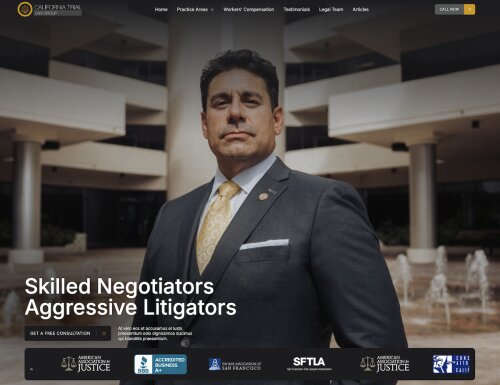Best Class Action Lawyers in Georgia
Share your needs with us, get contacted by law firms.
Free. Takes 2 min.
Or refine your search by selecting a city:
List of the best lawyers in Georgia, United States
About Class Action Law in Georgia, United States
Class action law in Georgia allows individuals who have suffered similar harm by the same defendant to join together in a single lawsuit. This legal mechanism is a powerful way for consumers, employees, or smaller entities to seek justice and compensation when the losses caused by a defendant are too small to justify individual lawsuits. Instead of proceeding separately, class members can combine their cases and strengthen their position against potentially large and powerful defendants. Class actions in Georgia are commonly seen in consumer fraud cases, defective product claims, labor law violations, and more.
Why You May Need a Lawyer
You may need a lawyer in class action cases if you have been harmed by the actions of a company or organization, especially when others have suffered similar harm. Common situations include:
- If you have purchased a defective or dangerous product
- If you have been a victim of improper business practices or consumer fraud
- If your employer has violated wage and hour laws impacting many employees
- If you are facing issues due to illegal fees or overcharges by financial institutions, service providers, or insurers
- If your personal data has been exposed because of a data breach
Lawyers can help determine if you have a viable class action claim, gather evidence, navigate the complex rules of class action litigation, and ensure your interests are represented throughout the legal process.
Local Laws Overview
In Georgia, class action lawsuits are governed by both state and federal law. The Georgia Civil Practice Act contains specific provisions for class actions under Section 9-11-23. To move forward, the party proposing the class must show:
- The class is so numerous that joining all members is impractical
- There are common questions of law or fact
- The claims or defenses of the representative parties are typical of the class
- The representative parties will fairly and adequately protect the class’s interests
Federal rules apply when the lawsuit is filed in federal court, particularly if it involves parties or issues across state lines. Georgia courts carefully scrutinize proposed class actions and may require extensive documentation before certifying the class.
Georgia law also imposes specific requirements for notification to potential class members and for the approval of any settlements, ensuring that all members have a chance to know about, opt out of, or object to the decisions affecting their rights.
Frequently Asked Questions
What is a class action lawsuit?
A class action lawsuit is a legal case brought by one or more individuals on behalf of a larger group who have similar claims against the same defendant. The outcome impacts all members of that group, called the class.
Who can be part of a class action in Georgia?
Anyone who has suffered the same or similar injury or loss as the group represented in the lawsuit may be included as a class member, unless they specifically choose to opt out.
Does joining a class action cost anything?
Most class action lawyers in Georgia work on a contingency basis, meaning you do not pay upfront. Their fees are typically paid from the settlement or judgment, if the case is successful.
How do I know if I am included in a class action?
You will usually receive a formal notice if you are identified as a potential class member. This notice informs you of your rights and options.
Can I opt out of a class action?
Yes, you are usually given an option to opt out if you wish to pursue your own claim separately or do not want to be bound by the case's outcome.
What kinds of cases are commonly class actions in Georgia?
Common class actions involve consumer fraud, defective products, wage and hour disputes, antitrust violations, security breaches, and insurance or banking fee disputes.
How long does a class action take?
Class actions can take several years from filing to resolution due to their complexity and the large number of parties involved.
Will I need to testify in court?
Most class members do not need to testify. Only the class representatives and certain witnesses may be required to appear.
What kind of compensation can I receive?
Compensation varies by case but may include refunds, damages for losses, or other court-ordered relief. Details are shared in settlement notices.
Should I consult a lawyer if I am notified about a class action?
Yes, consulting a lawyer is wise to understand your rights, especially if you are unsure whether to join, stay in, or opt out of a class action.
Additional Resources
If you are considering or involved in a class action case in Georgia, the following resources may be helpful:
- Supreme Court of Georgia and Georgia Court of Appeals for guidance on state case law
- Georgia Office of the Attorney General for consumer protection and reporting fraud
- State Bar of Georgia Lawyer Referral Service for finding a qualified class action attorney
- United States District Courts in Georgia for information on federal class action cases
- Legal aid organizations such as Georgia Legal Services Program and Atlanta Legal Aid Society
Next Steps
If you believe you might have a class action claim or want legal advice:
- Gather documentation about your claim including receipts, contracts, correspondence, or records of losses
- Research whether similar claims have already been filed or if a class action is ongoing that you may join
- Contact a Georgia class action attorney for a consultation. Many offer initial evaluations at no charge
- Review all notices and correspondence you receive about class action cases, and keep a record for your files
- Take prompt action. Legal deadlines may affect your ability to participate in or file a class action lawsuit
Legal issues can be complex, so working with an experienced class action lawyer in Georgia can help protect your rights and improve your chances of a fair outcome.
Lawzana helps you find the best lawyers and law firms in Georgia through a curated and pre-screened list of qualified legal professionals. Our platform offers rankings and detailed profiles of attorneys and law firms, allowing you to compare based on practice areas, including Class Action, experience, and client feedback.
Each profile includes a description of the firm's areas of practice, client reviews, team members and partners, year of establishment, spoken languages, office locations, contact information, social media presence, and any published articles or resources. Most firms on our platform speak English and are experienced in both local and international legal matters.
Get a quote from top-rated law firms in Georgia, United States — quickly, securely, and without unnecessary hassle.
Disclaimer:
The information provided on this page is for general informational purposes only and does not constitute legal advice. While we strive to ensure the accuracy and relevance of the content, legal information may change over time, and interpretations of the law can vary. You should always consult with a qualified legal professional for advice specific to your situation.
We disclaim all liability for actions taken or not taken based on the content of this page. If you believe any information is incorrect or outdated, please contact us, and we will review and update it where appropriate.
Browse class action law firms by city in Georgia
Refine your search by selecting a city.














